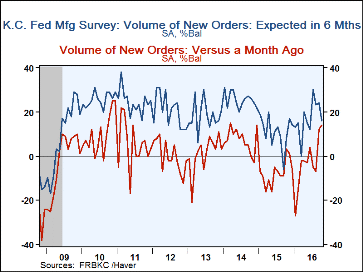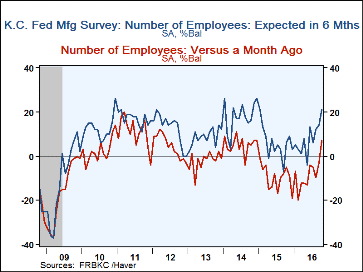 Global| Oct 27 2016
Global| Oct 27 2016Kansas City Federal Reserve Factory Index Stabilizes; Expectations Strengthen
by:Tom Moeller
|in:Economy in Brief
Summary
The Federal Reserve Bank of Kansas City reported that regional manufacturing sector business activity was unchanged at 6 during October. That represented improvement, however, versus negative readings registered back to early last [...]
The Federal Reserve Bank of Kansas City reported that regional manufacturing sector business activity was unchanged at 6 during October. That represented improvement, however, versus negative readings registered back to early last year. New orders have significantly strengthened, as have shipments. Employment also has grown along with the length of the employee workweek. Supplier delivery times have shortened. Prices continued to decline, although the rate of decline stabilized. Raw materials prices were unchanged.
Expectations for business conditions in six months improved greatly as a result of higher expected shipments. Growth in expected orders eased, however, following improvement since a year ago. Future employment registered the strongest reading since January of last year, but the expected workweek remained stable. Expected capital expenditures continued to improve as did expected export orders. The future inventories reading jumped. Expectations for prices continued to be positive, although the rate of increase sagged. Expected raw materials prices continued to strengthen.
The diffusion indexes are calculated as the percentage of total respondents reporting increases minus the percentage reporting declines. The survey included 94 responses from plants in Colorado, Kansas, Nebraska, Oklahoma, Wyoming and northern New Mexico. Data for the Kansas City Fed Survey can be found in Haver's SURVEYS database.
| Kansas City Federal Reserve Manufacturing Survey (SA) | Oct | Sep | Aug | Oct '15 | 2015 | 2014 | 2013 |
|---|---|---|---|---|---|---|---|
| Conditions Versus One Month Ago (% Balance) | 6 | 6 | -4 | -3 | -5 | 7 | 0 |
| New Orders Volume | 14 | 12 | -7 | 3 | -8 | 7 | 1 |
| Number of Employees | 7 | -3 | -10 | -5 | -10 | 5 | -2 |
| Prices Received for Finished Product | -5 | -7 | -7 | -4 | -5 | 5 | 4 |
| Expected Conditions in Six Months | 18 | 10 | 11 | 0 | 4 | 17 | 10 |
| New Orders Volume | 16 | 24 | 23 | 8 | 11 | 26 | 18 |
| Number of Employees | 21 | 14 | 12 | 6 | 6 | 18 | 9 |
| Prices Received for Finished Product | 8 | 7 | 17 | 10 | 9 | 26 | 24 |
Tom Moeller
AuthorMore in Author Profile »Prior to joining Haver Analytics in 2000, Mr. Moeller worked as the Economist at Chancellor Capital Management from 1985 to 1999. There, he developed comprehensive economic forecasts and interpreted economic data for equity and fixed income portfolio managers. Also at Chancellor, Mr. Moeller worked as an equity analyst and was responsible for researching and rating companies in the economically sensitive automobile and housing industries for investment in Chancellor’s equity portfolio. Prior to joining Chancellor, Mr. Moeller was an Economist at Citibank from 1979 to 1984. He also analyzed pricing behavior in the metals industry for the Council on Wage and Price Stability in Washington, D.C. In 1999, Mr. Moeller received the award for most accurate forecast from the Forecasters' Club of New York. From 1990 to 1992 he was President of the New York Association for Business Economists. Mr. Moeller earned an M.B.A. in Finance from Fordham University, where he graduated in 1987. He holds a Bachelor of Arts in Economics from George Washington University.










